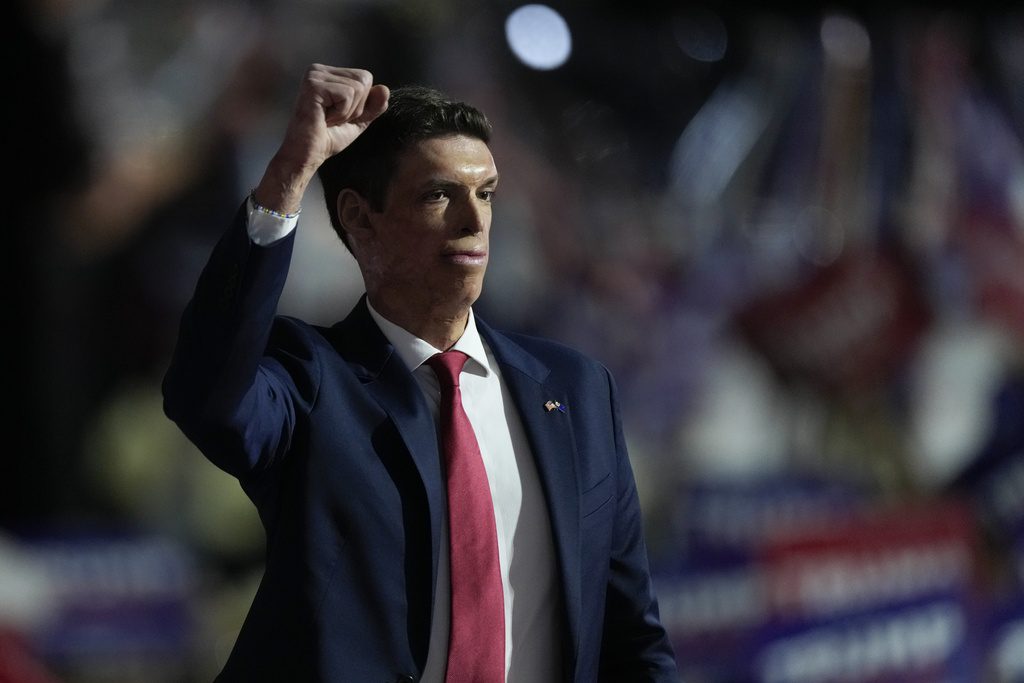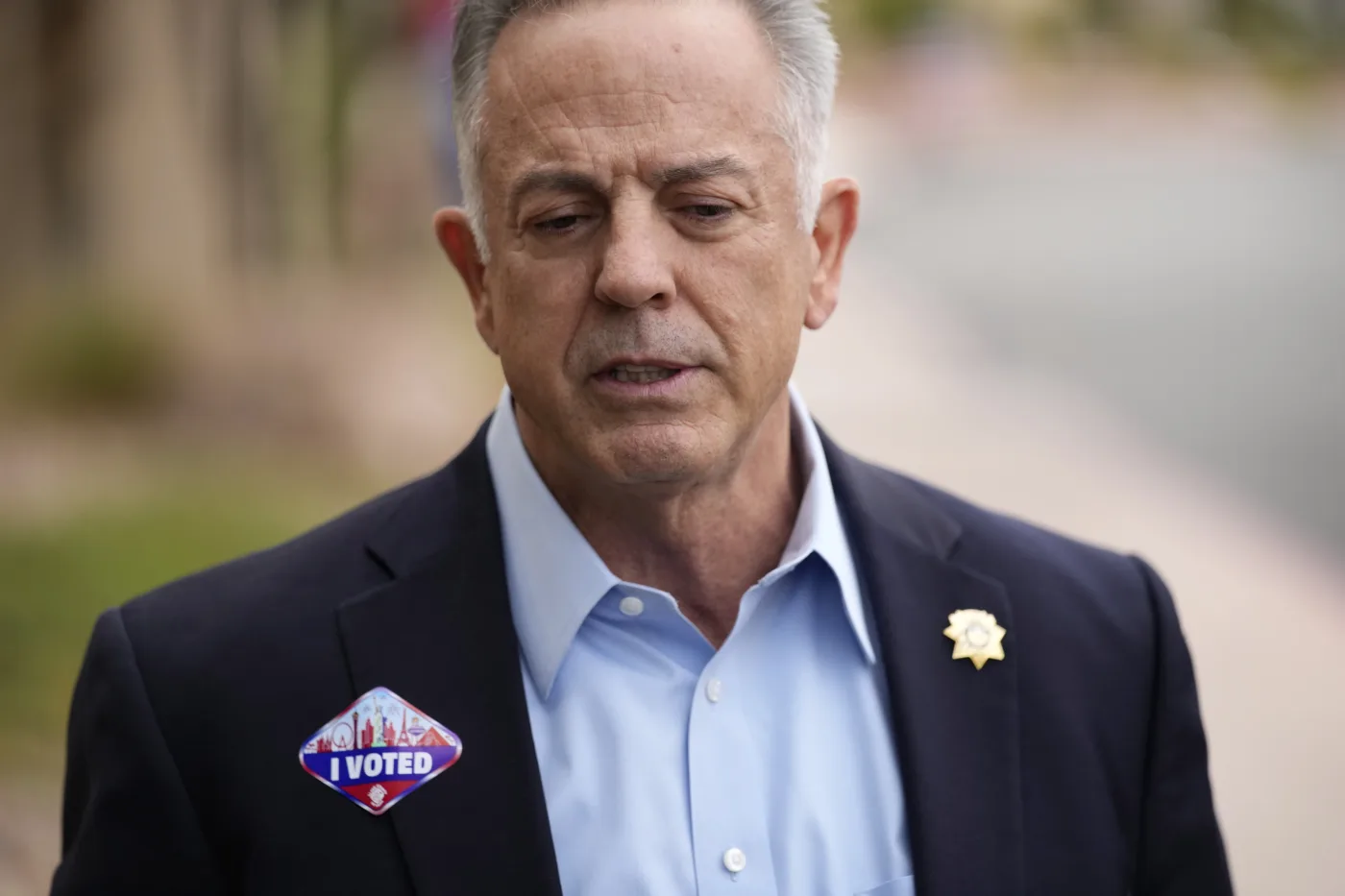
Sam Brown speaks during the Republican National Convention Tuesday, July 16, 2024, in Milwaukee. (AP Photo/Matt Rourke)
The Republican Senate candidate’s former company was awarded $2.7 million in federal contracts from 2020 to May 2022, representing nearly the entirety of its funding.
Sam Brown has forged his political persona as a conservative who has railed against large government spending bills, but Brown’s former business took on millions in government contracts while he was the acting chief executive, including several that were awarded after President Joe Biden took office, according to The Nevadan’s analysis of public records.
Before Brown became this year’s Republican nominee to represent Nevada in the US Senate, he was a Texas business owner who sought to provide military veterans access to sometimes vital prescription medications. In 2012, Brown founded Palisade Strategies, a pharmacy benefit management company that also supplies personal protective equipment and acts as a consulting company. The company claims it works on behalf of patients to reduce healthcare costs.
But Brown gave all that up in 2022, when he sold off his business to run in the Republican US Senate primary to challenge incumbent Nevada Democratic US Sen. Catherine Cortez Masto. Brown, a political unknown at the time, finished second behind former Nevada Attorney General Adam Laxalt, but garnered attention from several high-profile Republican fundraisers, who tapped him as the favorite to run this year against Democrat Jacky Rosen.
During his campaigns, Brown has criticized large government spending bills like the American Rescue Plan Act, the Inflation Reduction Act (IRA), the CHIPS and Science Act and other signature pieces of the Biden-Harris administration.
But Brown’s business was reliant on the same sort of federal spending.
Palisade began contracting with the US Department of Veterans Affairs in 2019, and was awarded more than $2.7 million in federal contracts from 2020 to 2021, according to data published to USAspending.gov, a website run by the federal government that tracks federal spending. That’s just shy of the $2.8 million Brown reported as the value of the company’s gross receipts on his financial disclosure form filed in May 2022.
MORE: Here’s where Senate candidate Sam Brown stands on reproductive rights
Of those contracts, the vast majority — approximately $1.4 million — were fulfilled to vendors in Nevada, though the company also held obligations in Virginia, Georgia, Missouri, and Arkansas, records show. Brown also entered into a purchase order for medication worth roughly $1.8 million that started April 1, 2021, and is set to expire at the end of March 2025.
The majority of those contracts were categorized as pharmacy refill services or pharmacy benefits administration, but also listed purchase orders for medical equipment such as a $450,000 order for N-95 masks placed in July 2020, records show.
Brown’s campaign did not respond to a request for comment from The Nevadan. But last December, Brown posted to the site X, formerly Twitter, that part of his rationale for starting Palisade Strategies was because he felt the VA was struggling to properly service veterans.
“I know quite a bit about the inefficiencies of the federal government — in fact, I started my small business that stepped in when the VA failed to get veterans the critical medications they need,” Brown’s account posted on Dec. 9. “We need more leaders in the Senate who know that more government isn’t the answer to our nation’s troubles.”
Brown himself is a retired US Army Captain whose career was cut short after a vehicle he was riding during a 2008 deployment to Afghanistan was struck by a roadside bomb. The explosion left Brown with severe burns that took years to recover from.
Like other Republicans in recent years, Brown has repeatedly claimed provisions of the IRA that allow Medicare recipients to access insulin for just $35 per month or cap out-of-pocket expenses for other prescription medications at $2,000 annually will eventually stifle competition and lead to higher prices for consumers.
He told The Nevada Independent last August that Democrats “misdiagnose” issues affecting the cost of medical care, and told the Reno Gazette Journal for a 2022 candidate questionnaire that, if elected, he would “immediately get to work on the deregulation of certain industries, such as healthcare and energy,” which he said would allow the industry to find innovative ways to cut costs.
While conservatives say too much government intervention could drive up costs in the future, many experts say pharmacy benefit managers, or PBMs, that are larger than Palisade — which is a registered small business — are a seldom-talked about reason that drug prices are so high today.
PBMs are companies that effectively serve as intermediaries between insurance companies, drug manufacturers, and pharmacies, negotiating to determine how much insurers pay drug makers as well as the payments pharmacies receive. In return, PBMs receive administrative fees from all three entities.
PBMs can also generate revenue from other streams. Part of their role is to negotiate rebates from drug makers so insurance plans get a discount on the drug’s “list price.” While PBMs are theoretically supposed to pass the full value of the rebate onto the consumer, they sometimes keep a portion of it. This incentivizes them to steer patients to higher-priced drugs with higher rebates. They also often receive a higher payment from insurers than what they pay to pharmacies for the drug, which further pads their profits at the expense of patients, who ultimately bear higher costs.
While Brown has pushed for deregulation in healthcare, many Democrats and industry experts are honing in on PBMs as an industry that are in need of more regulation to help lower drug costs.
In a press release last week following the group’s annual analysis of PBM markets, American Medical Association President Bruce Scott called for increased government oversight for the industry.
“The call for increased regulatory oversight of PBM business practices is overwhelmingly welcomed by physicians as a check against possible anticompetitive harm resulting from low competition and high vertical integration in the PBM industry,” Scott said. “The findings from the new AMA analysis warrant attention as Congress and the administration continue to work to protect patients and ensure prescription drugs remain affordable and accessible.”

Nevada Attorney General will appeal judge’s decision to toss fake elector case
The judge sided with attorneys who represent six Nevada Republicans who said Nevada Attorney General Aaron Ford erred in bringing the case before a...

Biden policy to help IRS collect up to $851 billion in back taxes from ultra-wealthy
The Internal Revenue Service (IRS) is poised to collect hundreds of billions of dollars of additional tax revenue by going after the overdue and...

‘Bending the rules’: Lombardo’s use of legal defense fund for ethics commission case draws scrutiny
Gov. Joe Lombardo’s decision to use a legal defense fund created during his 2022 election campaign for an ongoing legal battle with the Nevada...

Nevada Congressman Mark Amodei the spotlight of a new ad as government shutdown looms
The League of Conservation Voters, Climate Power, and House Majority Forward released a television spot this week aimed at holding Representative...


